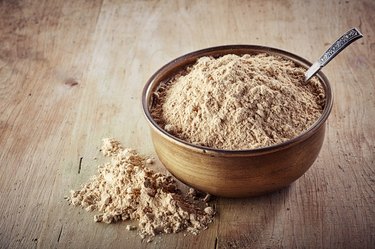
Dehydroepiandrosterone is a hormone naturally synthesized by your body. Manufacturers can also synthetically produce DHEA from chemicals found in wild yam and soy. This does not, however, mean that your body can make DHEA from wild yam or soy. Therefore, eating these foods will not increase your DHEA levels. Some herbs can, however, indirectly increase or boost your DHEA levels. You should speak with a medical professional prior to consuming any herbal supplement.
Wild Yam
Video of the Day
According to the book "Encyclopedia of Natural Medicine," natural doctors and herbalists used wild yam in the 18th and 19th centuries to treat stomach upsets, coughs, menstrual cramps and problems related to childbirth. In 1950, scientists discovered that wild yams contain diosgenin, a phytoestrogen that you can convert into progesterone. However, according to the book "Harrison's Principles of Internal Medicine," no scientific evidence exists that eating wild yams can turn diosgenin into progesterone or other hormones such as estrogen and DHEA in your body.
Video of the Day
Maca Root
Lepidium meyenii is maca's scientific name. Maca is a radish-like root that has several purported health benefits. According to "Encyclopedia of Natural Medicine," maca is an adaptogen, meaning this root has the capacity to raise your body's resistance to disease. Furthermore, the book states that maca has several medicinal uses, including the ability to relieve symptoms of menopause and the ability to slow down the aging process. Maca's health benefits result from this root's ability to enhance your hormonal system function and support adequate levels of DHEA, progesterone, testosterone, estrogen and the human growth hormone in your body.
Miscellaneous Herbs
According to the book "Encyclopedia of Natural Medicine," herbalists also recommend rhodiola rosea, also known as Golden Root, Roseroot or Aaron's Rod, and other plants such as Magnolia and Phellodendron extracts and Perilla oil to improve your body's energy system. These herbs support your glands' natural ability to regain normal function without creating extra burdens for your glands. Also, these herbs have the ability to restore your adrenal and thyroid function, allowing your body to rehabilitate energy molecules such as adrenaline and exert control over hormones such as cortisol and DHEA.
Conclusion
Several supplements on the market claim to boost your endocrine system and particularly DHEA levels commonly associated with fatigue, poor concentration and other symptoms. However, before taking any of these herbal supplements, you should make sure that you actually have a deficiency. A doctor can determine if you have low DHEA levels and can recommend medically sound treatment options for you. Additionally, a doctor can monitor and control your DHEA levels during the prescribed treatment plan.